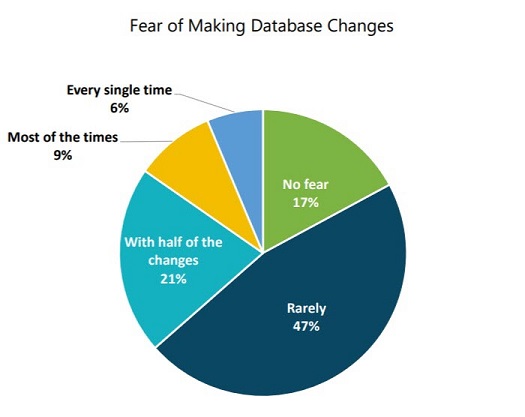Check Point® Software Technologies Ltd.(link is external) has emerged as a leading player in Attack Surface Management (ASM) with its acquisition of Cyberint, as highlighted in the recent GigaOm Radar report.
When was the last time your company experienced a significant database error? If it happened in the last 3 months, you’re in good company. A recent study conducted by DBmaestro asked 244 IT professionals this very question; 60% of respondents reported a crash or significant database error occurring in the last 6 months. Roughly one in ten respondents reported a serious database problem in the past week.
The survey, conducted online in October, sheds light on common practices in database management, errors and risks, as well as the rate of adoption of DevOps practices throughout all R&D functions. The results show that while DevOps practices have been widely adopted and utilized in application development, databases have been left behind. Crashes and major errors are prevalent among respondents, and even more so among companies that attempt to push database changes often.
Database Errors are Costly, Frequent, Dreaded
Database errors can be expensive; estimates vary, but studies show that an hour of database downtime can cost your business anywhere from $100,000 to $600,000+ an hour. These estimates have been growing steadily in the last several years, and can be even bigger for companies that rely heavily on timely database data retrieval for business operations.
While there can be many different causes for serious database errors, the 2018 Database Devops Survey reveals that the top causes are accidental overrides, invalid code and conflicts between teams. These three horsemen of the apocalypse account for over 50% of major database errors, respondents report.
For these reasons, it comes as no surprise that pushing changes to the database involves dread. In fact, over one-third of respondents reported that they are anxious about pushing database changes at least half the time.

DevOps Practices Used Widely – But Not for Databases
The fear-inducing errors that lead to crises when pushing new changes have all long been solved in the world of code development. With the extensive adoption of DevOps practices across multiple industries, similar errors in application development have been reduced to nothing. In fact, when asked about continuous delivery practices, 54% of respondents report that they are fully implemented in at least half of the company’s application development projects.
Adoption of these practices for the database is slow and lagging, the report shows. Only 36% of respondents report that they've implemented continuous delivery practices for database changes. On top of that, most respondents report that only the DBAs are allowed to push changes, often making them a bottleneck in the process.
It comes as no surprise that the result is slow, infrequent changes deployed to the database. Almost half (46%) of respondents reveal that they are only able to deploy database changes once or twice a month, a fact that stands in stark contrast to environments where CI/CD practices enable multiple deployments daily. In fact, only 14% of respondents currently have that capacity for database deployments.

Onward and Upward
The bottom line is clear: database needs to hop on the DevOps bandwagon, and fast. The only way to eliminate and prevent major database errors is by automating processes and adopting continuous delivery practices, stat. In turn, this will also improve the ability to push database changes often and fast, making the database as agile as any other part of the company’s development process.
Industry News
GitHub announced the general availability of security campaigns with Copilot Autofix to help security and developer teams rapidly reduce security debt across their entire codebase.
DX and Spotify announced a partnership to help engineering organizations achieve higher returns on investment and business impact from their Spotify Portal for Backstage implementation.
Appfire announced its launch of the Appfire Cloud Advantage Alliance.
Salt Security announced API integrations with the CrowdStrike Falcon® platform to enhance and accelerate API discovery, posture governance and threat protection.
Lucid Software has acquired airfocus, an AI-powered product management and roadmapping platform designed to help teams prioritize and build the right products faster.
StackGen has partnered with Google Cloud Platform (GCP) to bring its platform to the Google Cloud Marketplace.
Tricentis announced its spring release of new cloud capabilities for the company’s AI-powered, model-based test automation solution, Tricentis Tosca.
Lucid Software has acquired airfocus, an AI-powered product management and roadmapping platform designed to help teams prioritize and build the right products faster.
AutonomyAI announced its launch from stealth with $4 million in pre-seed funding.
Kong announced the launch of the latest version of Kong AI Gateway, which introduces new features to provide the AI security and governance guardrails needed to make GenAI and Agentic AI production-ready.
Traefik Labs announced significant enhancements to its AI Gateway platform along with new developer tools designed to streamline enterprise AI adoption and API development.
Zencoder released its next-generation AI coding and unit testing agents, designed to accelerate software development for professional engineers.
Windsurf (formerly Codeium) and Netlify announced a new technology partnership that brings seamless, one-click deployment directly into the developer's integrated development environment (IDE.)













